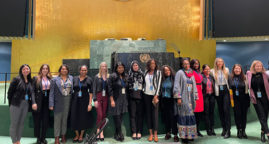The imperative of UN reform
On 31st October at 5 pm, Mr. Mr. Michael Møller, Director-General of the United Nations Office at Geneva gave a conference entitled “The imperative of UN reform” at the University of Geneva (Room MR160) followed by a round table with H.E. Ms. Maria Nazareth Farani Azevêdo, Ambassador/Permanent Representative of Brazil; H.E. Mr. Kok Jwee Foo, Ambassador/Permanent Representative of Singapore; H.E. Ms. Elayne Whyte Gómez, Ambassador/Permanent Representative of Costa Rica; H.E. Ms. Athaliah Lesiba Molokomme, Ambassador/Permanent Representative of Botswana; H.E. Mr. Geert Muylle, Ambassador/Permanent Representative of Belgium; H.E. Ms. Miriam Shearman, Ambassador/ Deputy Permanent Representative of United Kingdom.
This event was organised by the MEIG Programme (Master of Advanced Studies in European and international governance) and it was a good occasion to discuss different issues related to International Governance with our special guests.
Excellences,
Ladies and gentlemen,It is a pleasure to be with you this afternoon. Thank you Professor Kaddous and the University of Geneva for hosting us for this timely discussion.
Our title today is instructive. Neither question nor query, it reads simply: “The imperative of UN Reform”.
And rightly so. Because much as we debate and dispute other issues, on this one we can all agree: The United Nations, now in its 73rd year, must once again reform. Reform to adjust to new realities, to address new challenges, to seize new opportunities.
Here, however, the questions start: reform, yes, but how? To do what and why? To serve which or whose ends?
Today, I would like to approach these questions from three angles:
- First, the context of reform, looking at how the world has changed and what that means for the UN.
- Second, the mechanics of reform, looking at what the UN can and is tangibly doing to adapt.
- And finally, third, the compass for reform, looking at what the whole exercise is for.
I. Context
Let’s look first, then, at the context.
Regardless of which point in time you choose to compare today to, the magnitude of the change is astounding.Whether you go all the way back to the days of the San Francisco Conference that founded the UN in 1945, or whether you just look at the post-Cold War euphoria of the 1990s: today’s international relations seem radically different.
For better and worse, I should add. For recognizing these differences does not by itself imply a value judgement; it’s first of all a recognition of reality.
The settlement of the 1940s that created much of what we today consider the tenets of international order was an achievement of design, an accommodation to circumstances, and an adaptation to events.
Its establishment coincided with the emergence of the Cold War, the bipolar confrontation of two global superpowers. The Cold War’s fault lines were hotly contested, but the geopolitical landscape was otherwise neatly bifurcated into the West’s blue states and the East’s red states.
There was hardly a local conflict that was not a proxy for hegemonic confrontation; hardly an instance where diplomacy did not adhere to the strict logic of bipolarity.
Comparing then and now is instructive, because it shines a light on a critical development – and that is the dramatic diffusion of power.
In 1969 Henry Kissinger could still declare that the “axis of history starts in Moscow, goes to Bonn, crosses over to Washington and then goes to Tokyo”. Today, this historical cartography seems totally dated.
But it’s more than just a proliferation of mid-level states that act increasingly autonomously from the big powers.
Rather, power that used to be firmly in the hands of the state has metamorphosed into something much more diffuse: whether it’s non-state actors challenging the state’s monopoly of violence; or whether it’s private corporations evading effective regulation by any one state – power in international relations is altogether a more complex, messy affair.
One way to think about this change is as a contrast between hierarchy and order versus networks and entropy.
Whereas in the past, international relations were centralized – with core and periphery, with top-down commands and control – today, we live in an ‘age of entanglement’.
Global politics has been reconfigured. The traditional ‘chessboard’ of inter-state diplomacy may still exist, but it is joined by a new web of networks made up of governments, companies, NGOs, terrorist groups, philanthropists, and countless others – all wielding influence and cooperating or clashing at various points in time and place.
And these intricate connections are mirrored by the major existential challenges we face.
Looking at any one of them – escalating climate change, protracted conflicts, migratory movements, rampant inequality – you simply cannot disentangle one from the other.
They are very much connected:
- You cannot ask people fleeing war or worried about finding enough to eat today to worry about what carbon dioxide in the atmosphere will do to our planet tomorrow.
- You cannot blame people for questioning the legitimacy of a system in which eight men own as much wealth as the bottom half of humanity, many of whom survive on less than one dollar a day but because of technology know very well how the top 1% lives.
Contradictions such as these have given rise to a set of broader paradoxes:
- The world is more connected, yet societies are becoming more fragmented.
- Challenges are growing outward, while many people are turning inward.
- Cooperation is the only way to achieve shared success, but many leaders pursue a zero-sum competition that no one can win.
All of which produces the greatest contradiction of all: Multilateralism is under fire precisely at the moment when we need it most.
Now, defending multilateralism is not about striving to restore the status quo ante, to go back to the way things were. Because if yesterday’s tools are inadequate to tackle today’s problems, they will outright fail to fix tomorrow’s challenges.
But what it is about is saving the very foundations for international cooperation or call it global solidarity – the norms and rules we agreed to advance our shared interests; and the institutions we established to uphold and promote them.
At its most basic, it’s about saving the structure that over the past seven decades has raised standards of living for millions; forged peace in conflict-ridden lands, and ultimately, helped avoid a third world war.
Progress and peace: that, in a nutshell, is what saving multilateralism is about.
But to be saved, it needs to change.And much as the United Nations is at the heart of the multilateral order, it must be at the core of the change.
Change in terms of structures, mindsets and ways of doing business. We must adapt to new realities.
II. Mechanics
Which brings me to what I called the mechanics of reform, the things the UN is actually doing to change.
On this point, let me recall what one of the intellectual founding fathers of the UN, the American diplomat Ralph Bunche, already observed in 1950. “The UN”, he said, “exists not merely to preserve the peace but also to make change – even radical change – possible […] The United Nations has no vested interest in the status quo.”
If it did, it would long ago have outlived its usefulness. After all, many of the changes I just described did not emerge out of a vacuum – they echo transformations of decades past.
Take the 1970s, the decade in which I first joined the UN.
Back then, international relations already exhibited contradictory patterns: decolonization’s march strengthened a Westphalian system on a worldwide scale, but new patterns of globalization – vast flows of liquidity, migrants, and greenhouse gases – were already beginning to undercut the autonomy of the sovereign state.
The UN was an important locus of all these developments: both object and subject, it charted their emergence, reflected their ambivalences and shaped their course.
Today as much as in the 1970s, the institutions of the UN reflect an uneasy hybrid between traditions of Great Power consensus, and traditions of universalism that stress the equality of states.
Neither the end of the Cold War, nor the ever-accelerating globalization processes have disentangled this tension at the heart of the world body.Yet despite – or perhaps because of it- its many metamorphoses over the years, the UN has retained its place in the spotlight of international relations; then as now, believers and detractors vigorously debate the fortunes of an organization they simply find too useful to give up.
Partly, that is the result of the UN’s complex nature. Just two decades into its existence, an astute observer already described the UN as a “multifaceted and incongruous body, where no view permits seeing it whole and in detail at the same time.”
That is still true today. And because of its very “incongruity”, the UN has come to mean different things to different people at different times. It also allowed us – within reason and under institutional constraints – to re-invent ourselves.
This legacy of constant change is the backdrop to the ambitious reform agenda put forward by our Secretary-General António Guterres.
Let me briefly recap the three pillars of reform:
One, we are reforming our peace and security architecture – to ensure we are stronger in prevention, more agile in mediation, and more effective and cost-effective in peacekeeping operations. This pillar has been approved by the General Assembly earlier this year and will be rolled out in January next year.
Two, we are reforming our development system to become much more field-focused, better-coordinated, accountable and impactful. This has also been approved by the General Assembly, but without the necessary budget to fully implement it. That said, we have secured enough extra-budgetary funding to get started on this in January as well.
And three, to underpin all of these measures we are implementing sweeping management reforms – to simplify procedures and decentralize decisions, with greater transparency, efficiency, delegation of authority, and accountability.
A transversal effort that is a top priority for the Secretary-General, and one in which he has achieved tremendous progress early on, is our drive for gender equality.
Today, for the first time in United Nations history, there is full parity in our Senior Management Group and among Resident Coordinators leading country teams around the world.
Which demonstrates that reforms in areas within the competence of the Secretary-General are – sometimes – easier to realize than reforms that require the approval of our Member States.
III. Compass
All these different reform strands reinforce each other – and they are all grounded in unifying principles.
Which brings me to the third and last part of what I want to talk with you about today, and that’s the compass for reform.
The compass is the 2030 Agenda for Sustainable Development.
Much like a compass, the 2030 Agenda shows us where we want to go: towards a world free of poverty; towards a fairer world; towards a world that respects the limits of nature.
And the 17 Sustainable Development Goals are helping us get there.
Think about it in terms of three imperatives that lie at the heart of the 2030 Agenda:One, the imperative of prevention: the SDGs teach us to take the long-term view; to look beyond and to look deeper: Beyond the latest headline-grabbing crisis and deeper into the root causes of conflict. Focusing our efforts on prevention is cost-effective, sustainable and smart; but above all, it saves lives.
Two, the imperative of integration and horizontal cooperation: the SDGs are universal and indivisible, with progress towards one Goal driving progress in all others. This indivisibility means that to achieve the SDGs we ourselves must break down silos and overcome internal and institutional barriers towards truly collective efforts.
And three, the imperative of diversity and leaving no one behind: we always say the SDGs are everyone’s responsibility. Behind this demand lies the insight that I outlined before, namely that states are no longer the only game in town – to achieve the SDGs, we need everyone – from the private sector to civil society; from seasoned practitioners to youth advocates – to get involved. For the UN, this means that we must ensure everyone has a seat at the decision-making table.
If these imperatives sound a bit abstract, just look at what is happening right here, in Geneva. There is a real mindset change towards collaboration taking hold in ways I’ve never seen before: every day, we see new partnerships forming; we see innovations that bring into reach goals that would have only yesterday appeared utopian.
All of which is to say that we have a unique but fast-closing window of opportunity to effect real and meaningful progress in the lives of every of person on this planet.
And more than that, we have – with the reforms and the 2030 Agenda – set the UN on course to seize the opportunity. But we are not there yet. What’s missing isn’t the means, nor the capacity, nor the ambition. Sometimes it’s the political will.
And there is something else that is absolutely critical, and it’s about everyone here today: Individual responsibility and action.
Looking around the room, at the young in particular: There is no question we’re handing you a messy world. And we’re placing a huge responsibility on your shoulders.
Think about it: you are the first generation that can end extreme poverty, but you are also the absolute last generation that can curb climate change.
It’s true, we tend to speak more about the challenges we face, but that’s partly because it’s easier to map out the big problem than the thousands of individual actions that will constitute the solution.
Here, we are all betting on you, on your commitment, your creativity and your courage. To take charge and to take ownership. To be part of the solution, not on the sidelines.
Kofi Annan, who really was the ultimate optimist, used to dismiss the point that you are the “leaders of tomorrow”. Because what you really ought to be are the “change makers of today”. And right he was.
So let me close with this appeal: Trust that your actions will have consequences. That your efforts will make a difference. Because they will.
Thank you.
Related Articles
(Humanitarian Law & Policy Blog) ‘Catching up with the curve’: the participation of women in disarmament diplomacy
25/08/2022. Though it cannot be up to women alone to capture gendered impacts in treaty texts and outcome documents, their perspective has often helped to pave the way.
Denmark will get world’s first tech ambassador
01/27/2017. The job is yet to be filled, but the move highlights the growing importance of the tech sector for the Danish economy.
5 natural disasters that beg for climate action
Climate hazards are natural events in weather cycles. We are currently witnessing a scale of destruction and devastation that is new and terrifying.





